Why you'll only find real deal shawarma at this family-run Iraqi restaurant in Chandler
For the last five years, ever since I moved to Arizona from the Middle East, I've been on the hunt for one dish, a humble street food that is as beloved as it is ubiquitous at casual restaurants throughout the region — chicken shawarma.
Though I've found so-called shawarma on the menus of Lebanese, Palestinian, Iraqi and Turkish restaurants, none has come close to resembling the sandwich I fell in love with on the streets of Muscat and Dubai — tender, crisp-edged shavings of chicken swaddled in flatbread along with creamy garlic toum, pickles and a few French fries.
Until now.
In a Chandler strip mall at the intersection of Ray and Rural roads, Ali Al Zubaidi makes some of the best shawarma I've eaten anywhere at his aptly named restaurant, Supreme Shawarma.
"If you taste it there in Middle East, then you know what is good shawarma," Al Zubaidi said.
I couldn't agree more. And now that he's opened shop in metro Phoenix, no international flight is required for a taste of the real deal.
What shawarma is not
Though often billed as such, shawarma is not chicken or beef that is pan-sautéed, baked or otherwise cooked on anything besides a spit. Yet, at most places around the Valley, you'll find dishes being called shawarma that should simply be called something else.
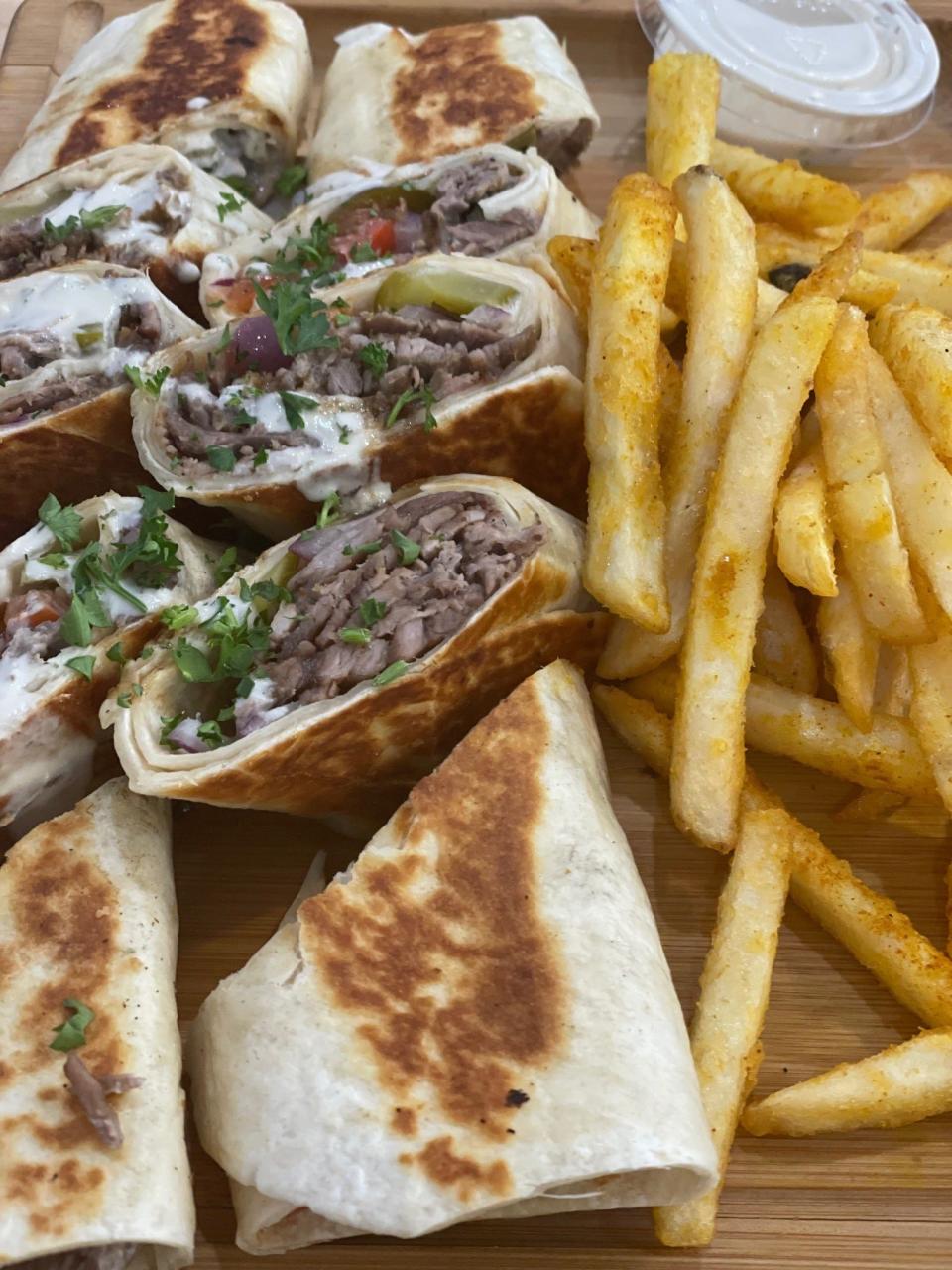
There is shish tawook, a Lebanese preparation that involves garlic and lemon marinated chicken that's either grilled or pan seared before being stuffed in a sandwich with toum, pickles and french fries and toped with a sprinkle of tart sumac. It is delicious and it is not shawarma.
There is jujeh kabob, a Persian grilled chicken tinged golden by a bath of saffron and yogurt. Also very, very good, either atop perfectly cooked basmati rice or wrapped in sangak flatbread with chopped vegetables. But again, it is not shawarma.
Then there are the preparations that are just plain bad. Vaguely Middle Eastern spiced chunks of white meat peeking out from dry rounds of store-bought pita. These in particular bare no resemblance to the gloriously, greasy shavings of spiced chicken that you'll find stuffed into tender, pliable saj bread with nothing but a pickle to serve as a briny counterpart to the rich meat and thick, luscious garlic spread.
OK, so what is shawarma?
Most people in the Middle East agree that the best shawarma comes from Turkey. In fact, the name itself comes from the Turkish word ?evirme, which means "turning," a reference to the vertical rotisserie cooking method.
The Turks are widely considered masters of the spit, known for their skill in marinating fatty cuts of chicken thighs and lamb and layering them into massive meat cones that can weigh over a hundred pounds.
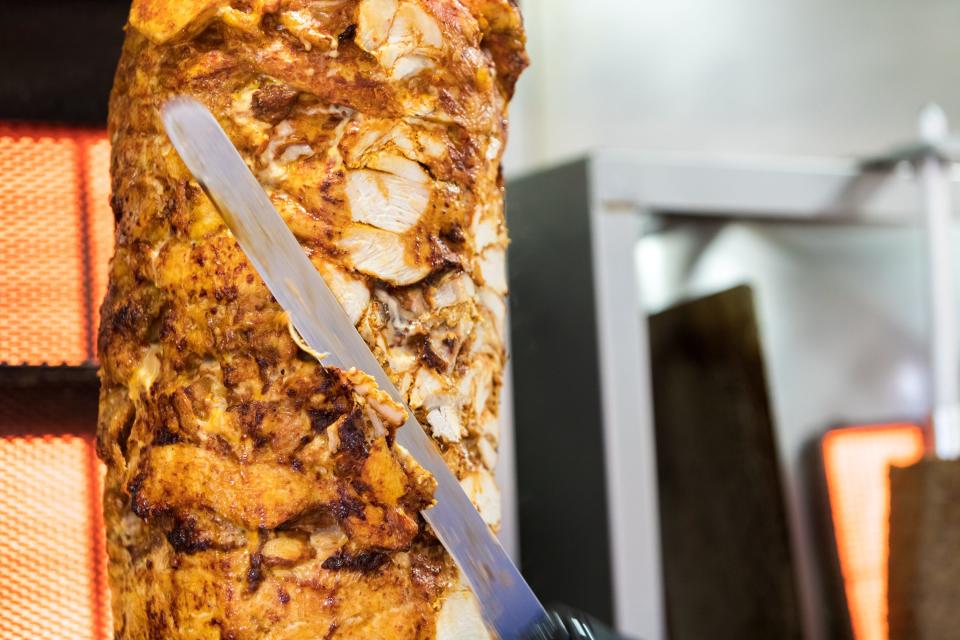
The meat rotates in front of a heat source, typically electric these days, and cooks from the outside in. As a crisp char forms on the outer layer, the meat is shaved off in fine layers that are served in sandwiches or as a plate alongside rice and hummus with a few perfunctory chopped vegetables on the side.
In Turkey, it's all about the meat, and the sandwiches are thus kept simple, with fewer sauces or toppings to distract from the flavor of the marinade. Called doner kebab, another reference to the rotating motion, it is often eaten without bread at all, served instead with roasted vegetables and rice. The flavorful spit roasted delicacy evolved when it was introduced to Germany by Turkish immigrants. To suit the local palate, the meat was served in sandwich form, buried under shredded lettuce and sauces.
The Greek variation, called a gyro, is cooked in a similar fashion but couldn't be more different in both flavor and presentation. It can be made using pork, beef or chicken and typically comes slathered in a yogurt-based herbed sauce called tzatziki in a thicker round of bread that cradles the fillings in a half-moon shaped sandwich.
The Arabic variations of the Turkish specialty stick closer to the original but are dressed up with a few more toppings, such as pickles, garlic sauce or nutty tahini.
Every country, and every vendor for that matter, makes it a little bit differently. And what sets the good apart from the great comes down to the marinade, which is a shawarma master's most closely guarded secret.
The one and only: 'Julia' will make you fall in love with the culinary icon all over again
The best shawarma in metro Phoenix and possibly the entire West Coast
"I worked in restaurants 38 years," Al Zubaidi said, adding that he grew up watching his dad in the kitchen of their family restaurant in Baghdad. "Every day, I learn a little more."
Prior to opening Supreme Shawarma in August 2021, Al Zubaidi worked for other Middle Eastern restaurants around metro Phoenix. "I would make marinades for three different locations, in Chandler, Phoenix and Peoria," he explained. "But I don't always agree with the way they do things, I wanted to do it my way."
He began looking for a restaurant space over two years ago. "But for new businesses, no one wants to take the chance," he said. When his friend and real estate agent Hani Shalabi told him about the space in Chandler, which is over 45 minutes away from his home in Peoria, he didn't hesitate.
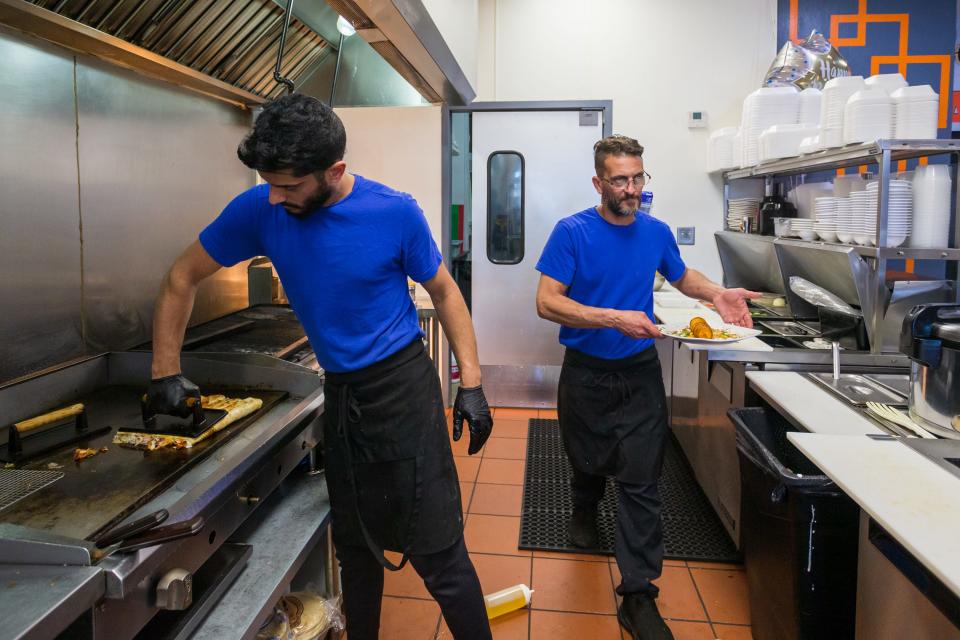
"The space was so bad," he laughed, describing the way he and his family worked together to renovate and knock down the kitchen walls. "I don't want to hide anything. I want people to see us cook, to see how fresh it is."
Freshness is one of the reasons his shawarma is so good. "I go and buy meat myself. I open the packages to check how it looks. If the expiring date is soon, I will not buy it, I'll go to another store," he said. "Every night, I marinate for the next day."
During the week, he and his sons make a 60-pound cone of chicken and a 40-pound cone of beef each day. On the weekend, he makes 120 to 180 pounds of chicken per day.
"It takes three of us to lift them into place," he said, adding that it's usually gone by 7:30 p.m. "At the end of the day, whatever is not sold, I throw it out."
The freshness of the meat allows the flavors of his marinade, an adaptation of the recipe his father used back in Baghdad, to shine.
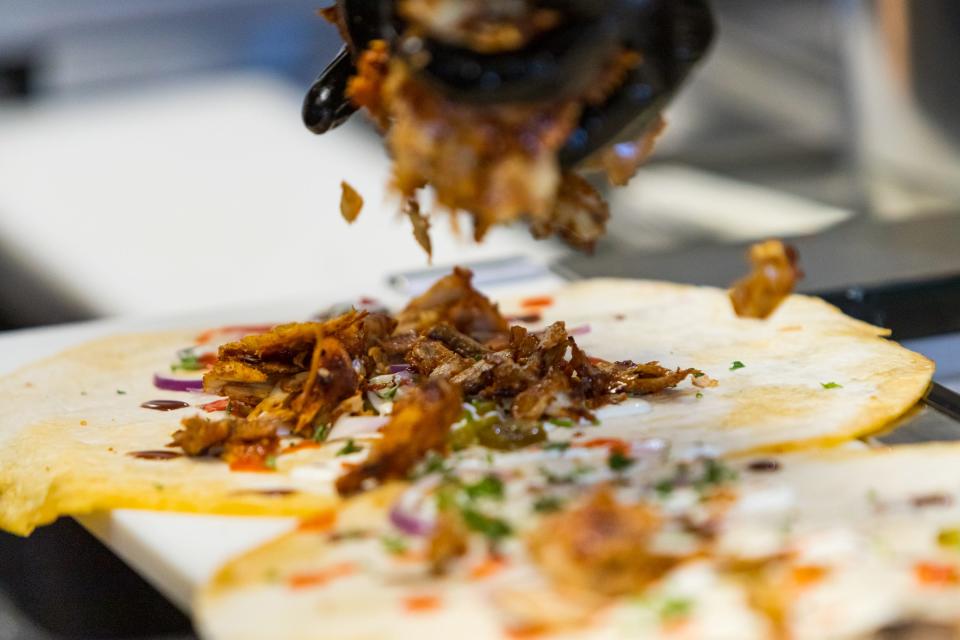
What's on the menu at Supreme Shawarma
"In Iraq, we use more lemon. In Syria, no. But more tahini. Lebanon, same. Jordan is more like us. Turkiye, they make the best in the world," he explained.
Though Al Zubaidi is Iraqi, he doesn't add specifically Iraqi touches, like amba, a savory mango chutney, or boat-shaped samoon bread. Instead, he has stayed faithful to a more pan-Arabic style of shawarma, which appeals to the nostalgic tastes of customers from all over the region.
Both the chicken and the beef are cooked on classic vertical spits and are finely shaved into saj flatbread. The wraps are then browned on the flat top grill and cut into inch-thick pinwheels before serving with a side of French fries.
I've always been partial to chicken shawarma, but whenever I visit Supreme Shawarma, I can't help but order both. The beef is lean and tender, wrapped with a whisper of diced sweet red onion and parsley and served with a side of a tangy, herbed yogurt sauce.
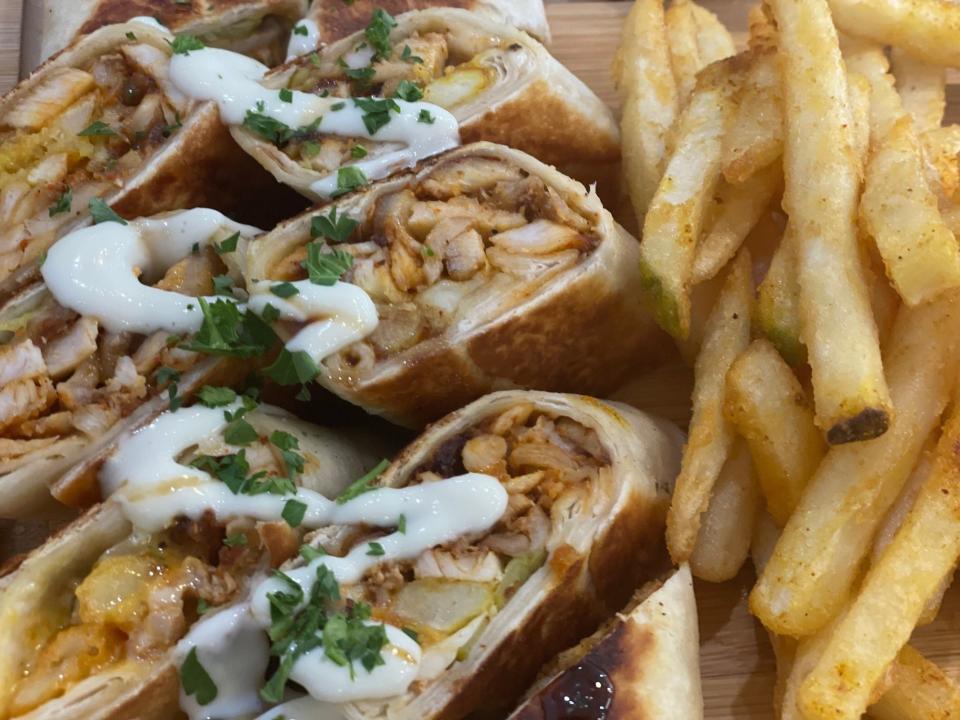
For the chicken shawarma, Al Zubaidi uses chicken breasts rather than the more commonly used chicken thighs and, by some culinary magic trick, he manages to make them just as unctuous and moist. He wraps the chicken with a few salty French fries, a pickle and a healthy smear of toum before drizzling the sandwiches with tart pomegranate molasses — an uncommon touch that is all his own.
The chicken sandwich comes with a side of garlic sauce, but regardless of whether you order the chicken or beef, I suggest asking for a side of both sauces.
There are other items on offer, including falafel and kebab, which are good. But you don't go to Supreme Shawarma for anything but the namesake.
That said, the babaghanoush is the one dip you really shouldn't pass up. It's smoky with just the right amount of creamy, nutty tahini and it comes topped with a hearty glug of herbaceous olive oil and more of that lovely sweet-tart pomegranate molasses.
A place for people who know
The casual restaurant buzzes with the kind of Arabic hospitality that offers as much satisfaction as the food being served. Things are cheerfully busy, even as the phone rings off the hook and customers line up out the door. Everyone from the cashier to the owner is happy to see you.
If your sandwich is taking a while, Al Zubaidi will likely appear with bowls of a dill-heavy, soul-soothing Iraqi lentil soup to enjoy while you wait.
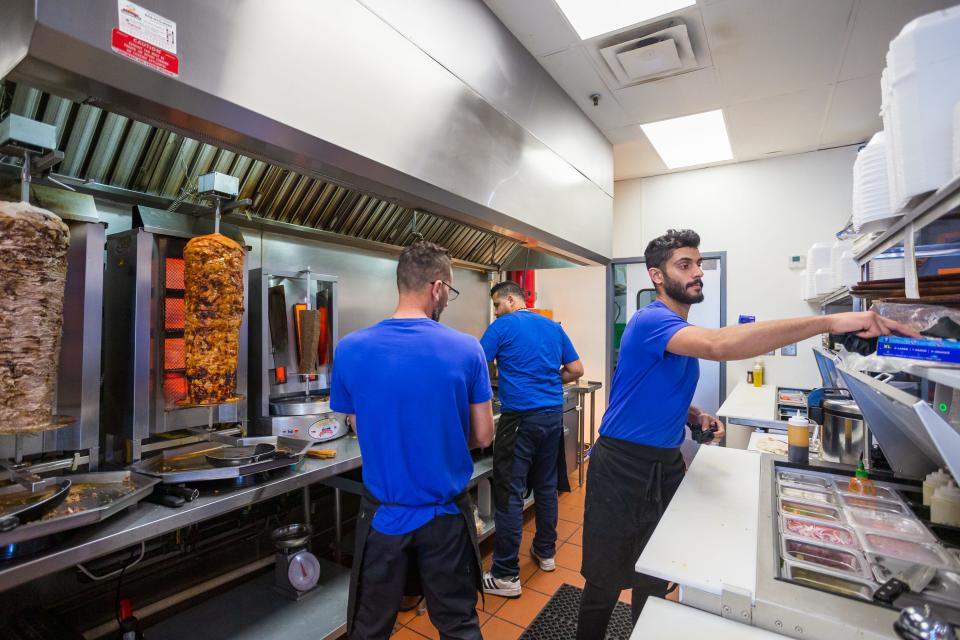
It's a family restaurant in every sense, run top-to-bottom by Al Zubaidi, his sons, his wife and his friend Mohamed Al Jaburi. His daughters-in-law come to help out on weekends. "I don't have employees, I don't have customers. I have partners. Everyone made this possible," he said.
The one aspect of the business that remains Al Zubaidi's responsibility alone is the marinating of the meats, a craft he's spent nearly four decades perfecting. And perfected he has.
The proof is in his ever-crowded dining room. Al Zubaidi walked up to a table of young Middle Eastern students. "You came all the way here from Tempe?" he asked, rhetorically. "And how many Arabic restaurants are near you there?"
"Too many," one of them said, laughing. "But, not like yours."
"I appreciate them. These students come so far. I am going to start giving discounts for them," he said. "I don't do this for money. Of course, everyone needs money, but I don't do it for that. This is for love. I love my job. I love to cook. I love my customers."
Details: Supreme Chicken ($14.99), Supreme Beef ($15.99) and babaghanoush ($5.99-$7.99) at Supreme Shawarma, 4929 W. Ray Road, Chandler. 480-940-2384, supremeshawarma.com.
Food on film: David Chang's new show isn't about the future of food. It's about him
Reach the food, dining and nightlife editor at [email protected]. Follow her @hungryfi on Twitter and Instagram.
This article originally appeared on Arizona Republic: What is shawarma? Find out at this family-run restaurant in Arizona
